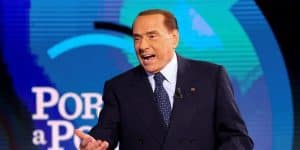
Men’s downhill silver medal winner Kjetil Jansrud, left, with his compatriot Aksel Lund Svindal, who took gold (Christophe Ena/AP)
We cover today the Italian elections, Israeli Prime Minister Netanyahu under fire, the suspenseful US trade situation, and for levity, Norway’s Olympic triumphs and Prime Minister Trudeau’s hitherto unsuspected talents at make-believe.
What’s with those Norwegians?
We liked this Politico piece on why the Norwegians cleaned up so many medals in the Winter Olympics.
On a similarly light note, we have Powerline’s “Monday in Pictures: Canadian Idiot Edition,” starring the country’s Prime Minister.
h.t.: Eaglebeak
Upcoming Italian elections
Italy has its comedians as well, witness the brothel-legalization plank of the Lega Nord party in the forthcoming Italian general election:
“If this business [prostitution] surfaces it would be hugely significant for the state and local authorities, to collect enough resources not only to avoid tax hikes but also to reduce a series of tax levies,” Massimo Bitonci, a senior figure in the party said in 2013.
“There is no point in hiding behind hypocrisy and taboo; prostitution is a phenomenon that has always existed.”
“I’m not talking of having messy brothels like in the past or putting women behind a shop window,” Matteo Salvini, the party’s leader, said last year. Salvini believes that legalising brothels will not only increase tax revenues, but could also boost Italy’s birth rate.

Former Italian prime minister and present candidate, Silvio Berlusconi (Thomson Reuters)
On a more economically promising note, former Prime Minister Silvio Berlusconi is making a comeback with his center-right Forza Italia party. One of his party’s important planks is to switch Italy to a flat tax “encompassing everything from income tax to sales taxes to car tax.” This would be an excellent idea for Italy, which has an overly complex tax system and huge underground economy trying (usually successfully) to escape arbitrary taxation.
Netanyahu’s problem
Israeli Prime Minister Benjamin Netanyahu has a problem somewhat like President Trump’s: his leadership is being undermined and threatened with overthrow by a judiciary and national police that are a law unto themselves. But Trump’s threat from bad apples in the Justice Department and FBI leadership has a chance of being cleaned up. Netanyahu is not so lucky; his problems have become constitutional. Caroline Glick explains how this came about.
President Trump’s suspended shoe
Investment in export and import-oriented businesses and manufactured goods is likely to be put on hold for the next two months, just as it was at the end of last year until the fate of the tax reform bill was known. In this case what is creating the suspense — not just in the US but with trade partners worldwide — is not the fate of a Congressional bill but a decision by President Trump.
Our trade correspondent L.C. reports on this shoe — filled with tons of steel and aluminum ingots — waiting to drop:
Last week’s release of the Commerce Department’s reports and recommendations from its steel and aluminum Section 232 investigations incited a huge response, from domestic industries and from foreign governments and industries (see our last Report). Section 232 governs imports that are alleged to threaten national security.
Most reactions were negative — even to the weakest of the three options presented by Commerce to the President. The dangers pointed to by critics were, as they have been since the 232 investigations began, the threat of foreign retaliation, the risk of copy-cat moves as other countries use the national security exemption to block US exports (a peril for the global rules-based trading system as well as US exports), the commercial danger that import restrictions would pose to US industries all along the value chain and in many sectors, and the threat to US strategic alliances.
Beyond the domestic and foreign responses, this week Commerce also released an undated two-page memo signed by Defense Secretary Jim Mattis giving the DoD’s view of the 232 investigations. It confirmed what had been long reported – that the Defense Department doesn’t see a national security threat from steel and aluminum imports and opposes strong actions.
The US press reported late this week that President Trump favors imposing the toughest among the options presented to him, a universal tariff. He has full discretion to:
- accept what Commerce recommends,
- revise a recommendation,
- do something entirely different, or
- do nothing at all.
But according to Bloomberg, sources report that the President has “told confidants that he wants to impose the harshest tariffs… recommended by the Commerce Department.”
For steel, that would mean a tariff on all steel imports of at least 24%, and a tariff on all aluminum imports of at least 7.7%.
The EU is particularly outspoken against the Commerce recommendations. European leaders have long made it clear they would not accept protectionist actions under Section 232. After the reports were released, an EU official told reporters, “The EU stands ready to react swiftly and appropriately in case our exports are affected by any restrictive trade measures from the US.” The Europeans have already been planning a retaliation list targeted to bring pain to states that are politically important to the Trump Administration.

Protectionist trade adviser Peter Navarro
According to late-week press reports, President Trump’s trade adviser Peter Navarro is being given the position of “assistant to the President,” an elevation that gives him more clout and a more direct role in influencing trade policy. His re-elevation at this time would be seen as signaling that the President is intent on following through on his protectionist campaign pledges, perhaps starting with a hard response on Section 232. As a source said to this reporter, elevating Navarro’s role “would certainly send a signal that the Administration isn’t listening to anything Republicans in Congress are trying to tell the President.”
Click here to go to the previous issue of Founders Broadsheet (“Republicans, Trump cave on guns; Mueller plagiarizes Russian journalists”)

Leave a Reply